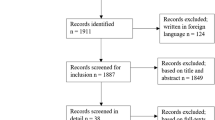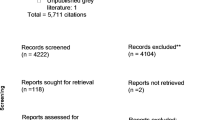Abstract
Loot boxes can provide a competitive advantage to gamers, but there is limited information on how to self-regulate purchases. This study aimed to identify the behaviour change techniques (BCTs) for the self-regulation of loot boxes. A thematic analysis was applied to 777 statements obtained from a systematic search of websites containing real-world experiences. Eleven BCTs and 47 strategies were identified for self-regulation including antecedents (avoidance, environmental restructuring), substitution (spending game credits not money), identity (purchasing loot boxes is a waste of money and inconsistent with values), self-control (use of willpower), and a comparison of risk versus out-right purchases. A further eight BCTs and 38 strategies were identified that could be administered by parents including environmental restructuring (removing stored credit cards, limiting access to games), persuasion (better ways to spend money, budgeting), and monitoring (observing play or expenditure). Multi-faceted support for self-regulation may be needed for children and adult consumers of loot boxes.
Similar content being viewed by others
References
Baumeister, R. F., & Heatherton, T. F. (1996). Self-regulation failure: an overview. Psychological Inquiry, 7(1), 1–15.
Baumeister, R. F., Heatherton, T. F., & Tice, D. M. (1994). Losing control: How and why people fail at self-regulation. Academic Press.
Benhsain, K., Taillefer, A., & Ladouceur, R. (2004). Awareness of independence of events and erroneous perceptions while gambling. Addictive Behaviors, 29(2), 399–404.
Benrazavi, R., Teimouri, M., & Griffiths, M. D. (2015). Utility of parental mediation model on youth’s problematic online gaming. International Journal of Mental Health and Addiction, 13(6), 712–727.
Braun, V., & Clarke, V. (2012). Thematic analysis. In H. Cooper (Ed.), The handbook of research methods in psychology (pp. 57–71). Washington, DC: American Psychological Association.
Brooks, G. A., & Clark, L. (2019). Associations between loot box use, problematic gaming and gambling, and gambling-related cognitions. Addictive Behaviors, 96, 26–34.
Brooks, G., Ferrari, M., & Clark, L. (2020). Cognitive factors in gambling disorder, a behavioral addiction. In A.Verdejo-Garcia (Ed.). Cognition and Addiction. Researcher’s Guide from Mechanisms Towards Interventions (pp. 209-219). London: Academic Press.
Delfabbro, P., King, D., & Gainsbury, S. M. (2020). Understanding gambling and gaming skill and its implications for the convergence of gaming with electronic gaming machines. International Gambling Studies, 20(1), 171–183.
Drummond, A., & Sauer, J. D. (2018). Video game loot boxes are psychologically akin to gambling. Nature Human Behaviour, 2(8), 530–532. https://doi.org/10.1038/s41562-018-0360-1.
Jacques, C., Fortin-Guichard, D., Bergeron, P. Y., Boudreault, C., Lévesque, D., & Giroux, I. (2016). Gambling content in Facebook games: A common phenomenon?. Computers in Human Behavior, 57, 48–53.
King, D. L., & Delfabbro, P. H. (2019). Video game monetization (e.g.‘loot boxes’): a blueprint for practical social responsibility measures. International Journal of Mental Health and Addiction, 17(1), 166–179.
King, D. L., Delfabbro, P. H., Gainsbury, S. M., Dreier, M., Greer, N., & Billieux, J. (2019). Unfair play? Video games as exploitative monetized services: an examination of game patents from a consumer protection perspective. Computers in Human Behavior, 101, 131–143.
Michie, S., Richardson, M., Johnston, M., Abraham, C., Francis, J., Hardeman, W., Eccles, M. P., Cane, J., & Wood, C. E. (2013). The behavior change technique taxonomy (v1) of 93 hierarchically clustered techniques: building an international consensus for the reporting of behavior change interventions. Annals of Behavioral Medicine, 46(1), 81–95.
Neale, J. (2016). Iterative categorization (IC): a systematic technique for analysing qualitative data. Addiction, 111(6), 1096–1106.
Rodda, S. N., Hall, K., Staiger, P., & Dowling, N. (2016). Self-regulation in disordered gambling: a comparison with substance use disorders. In M. Kyrios, R. Moulding, G. Doron, S. Bhar, M. Nedeljkovic, & M. Mikulincer (Eds.), The self in understanding and treating psychological disorders (pp. 134–143). Cambridge: Cambridge University Press.
Rodda, S. N., Hing, N., Hodgins, D. C., Cheetham, A., Dickins, M., & Lubman, D. I. (2017). Change strategies and associated implementation challenges: an analysis of online counselling sessions. Journal of Gambling Studies, 33(3), 955–973. https://doi.org/10.1007/s10899-016-9661-3.
Rodda, S. N., Bagot, K., Cheetham, A., Hodgins, D. C., Hing, N., & Lubman, D. I. (2018a). Types of change strategies for limiting or reducing gambling behaviours and their perceived helpfulness: a factor analysis. Psychology of Addictive Behaviors, 32(6), 679–688. https://doi.org/10.1037/adb0000393.
Rodda, S. N., Booth, N., Vacaru, M., Knaebe, B., & Hodgins, D. C. (2018b). Behaviour change strategies for internet, pornography and gaming addiction: a taxonomy and content analysis of professional and consumer websites. Computers in Human Behavior, 84, 467–476.
Rodda, S. N., Hing, N., Hodgins, D. C., Cheetham, A., Dickins, M., & Lubman, D. I. (2018c). Behaviour change strategies for problem gambling: an analysis of online posts. International Gambling Studies, 18(3), 420–438.
Wardle, H. (2019). The same or different? Convergence of skin gambling and other gambling among children. Journal of Gambling Studies, 35(4), 1109–1125.
Zendle, D., & Cairns, P. (2018). Video game loot boxes are linked to problem gambling: results of a large-scale survey. PLoS One, 13(11), e0206767.
Zendle, D., & Cairns, P. (2019). Loot boxes are again linked to problem gambling: results of a replication study. PLoS One, 14(3), e0213194.
Zendle, D., Meyer, R., Waters, S., & Cairns, P. (2019a). The prevalence of loot boxes in mobile and desktop games. https://doi.org/10.31234/osf.io/mkhp2.
Zendle, D., Meyer, R., Waters, S., & Cairns, P. (2019b). The prevalence of loot boxes means that content descriptors are just as important as limit setting when it comes to minimising potential harm: a reply to Drummond et al. Unpublished working paper.
Author information
Authors and Affiliations
Corresponding author
Ethics declarations
Conflict of Interest
The authors declare that they have no conflict of interest.
Ethical Approval
All procedures followed were in accordance with the ethical standards of the responsible committee on human experimentation (institutional and national) and with the Helsinki Declaration of 1975, as revised in 2000.
Additional information
Publisher’s Note
Springer Nature remains neutral with regard to jurisdictional claims in published maps and institutional affiliations.
Appendix
Appendix
Rights and permissions
About this article
Cite this article
Gong, L., Rodda, S.N. An Exploratory Study of Individual and Parental Techniques for Limiting Loot Box Consumption. Int J Ment Health Addiction 20, 398–425 (2022). https://doi.org/10.1007/s11469-020-00370-5
Published:
Issue Date:
DOI: https://doi.org/10.1007/s11469-020-00370-5




